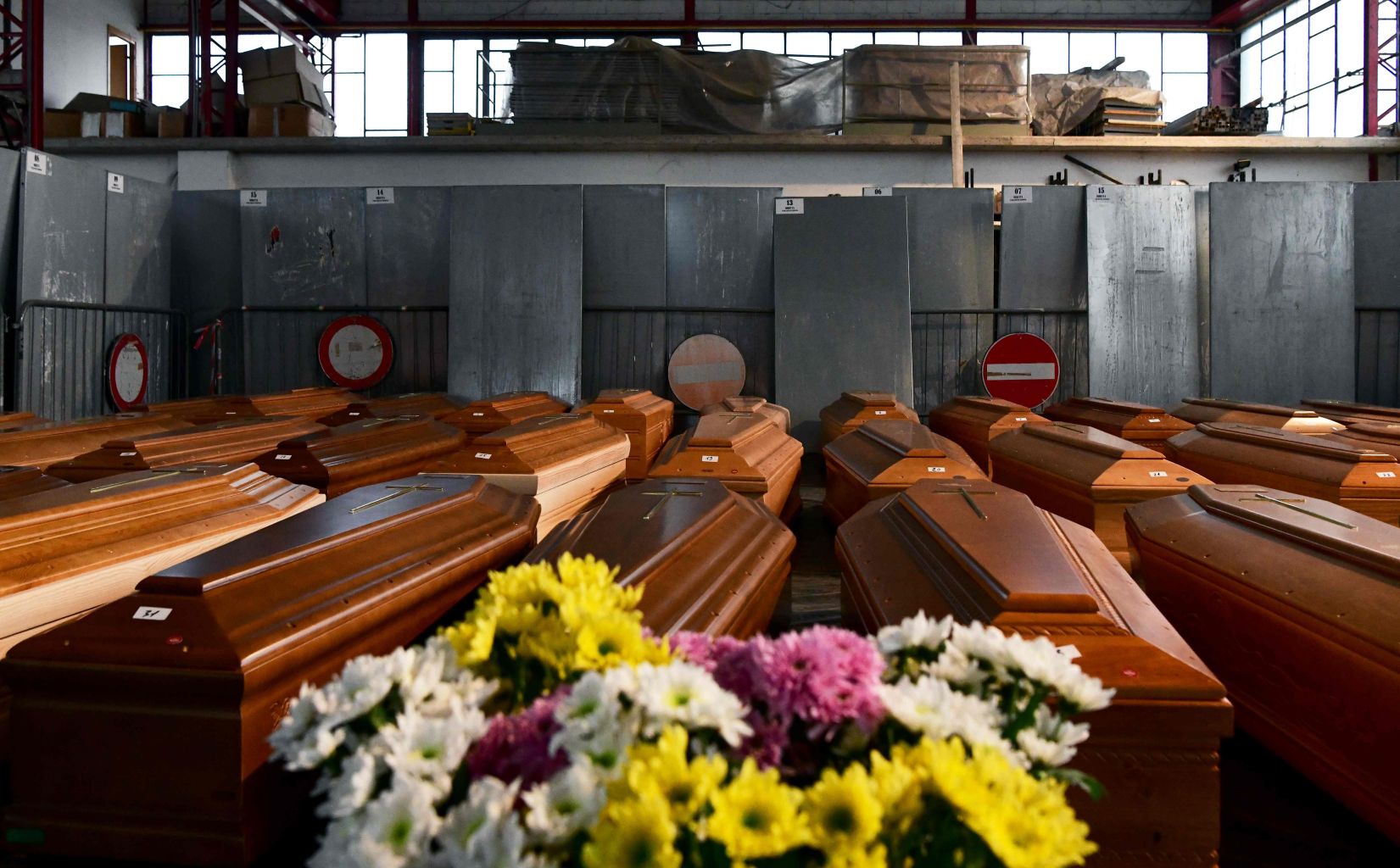Coronavirus: Hard-hit Italy and frugal Germany lock horns as EU wrangles over cash response
Sign up now: Get ST's newsletters delivered to your inbox

A general view shows some of 35 coffins of deceased people stored in a warehouse in Ponte San Pietro, near Bergamo, Lombardy, on March 26, 2020, prior to be transported in another region to be cremated.
PHOTO: AFP
Follow topic:
BRUSSELS/ROME (REUTERS) - Italy, the European country the hardest-hit by the coronavirus, led the push on Thursday (March 25) for virtually unlimited support for the ravaged economy as European Union leaders wrangled over how far to go, but ran into firm resistance from Germany.
Germany, the Netherlands and their frugal allies first blocked an idea by Italy, France and seven other EU countries to issue joint debt, a sign of how the pandemic is testing the bloc's cohesion.
The 27 national EU leaders then went on a video conference to fight over a proposal by the euro-zone finance ministers to set up a credit line worth some 2 per cent of their economic output from the European Stability Mechanism bailout fund of the 19-member single-currency zone.
Italian Prime Minister Giuseppe Conte rejected the draft agreement of the 27 EU leaders as too timid, his office said.
"We need to react with innovative financial instruments," Conte's office said in a statement as the leaders' call stretched into its fourth hour, adding that the Italian leader demanded more ambitious proposals in the next 10 days.
Since the disease arrived in Europe after originating in China late last year, the EU has struggled to present a united front on economic stimulus, the sharing of medical equipment and safeguarding of essential supplies after countries across the continent tightened or closed their normally open borders to try and curb the spread of the coronavirus.
Charles Michel, who as president of the European Council chairs EU summits, has called for a new "Marshall Plan" - named after the US aid package that kick-started Western Europe's recovery after World War II.
But Paris, Rome and Madrid were at odds with Berlin, Vienna and Helsinki, with the former camp pushing to go as far as possible swiftly and the latter urging restraint.
"Italy desperately needs strong message now, but... the crisis is far from over and we need to save some firepower should it be needed later on," said an EU diplomat.
EU UNITY TESTED
The bloc has already suspended state aid rules and limits on public borrowing to allow member states to spend freely to cushion the economic hit. The European Parliament was due later on Thursday to approve €37 billion (S$58 billion) worth of emergency funds and measures to help airlines.
Berlin and its allies say all EU states can still finance themselves on the debt market, and the European Central Bank has announced emergency bond purchases to put €750 billion into circulation.
The ECB has also ditched a cap on how many bonds it can buy from any single euro-zone country, which some EU states welcomed as lowering the pressure on governments to act now.
The divisions further strained the bloc's unity and solidarity, already damaged by the 2008-12 euro-zone crisis, the 2015-16 wave of immigration from the Middle East and Africa, and Britain's departure from the bloc earlier this year.
EU leaders were due to agree to shield their strategic healthcare and infrastructure firms from foreign hostile takeovers amid the pandemic, but were also sparring over medical equipment shortages and emergency border curbs that have caused tailbacks in what normally is Europe's zone of free travel.
Europe marks the 25th anniversary of the open-border Schengen agreement on Thursday with its borders shut or subject to emergency checks, slowing deliveries of basic goods.
Italy has reported more than 80,000 infections and 8,160 deaths due to coronavirus.
After the bloc initially left Italy to fend for itself in the outbreak, Rome managed to secure protective equipment from China and Russia, the EU's geo-strategic rivals, rather than its peers.

